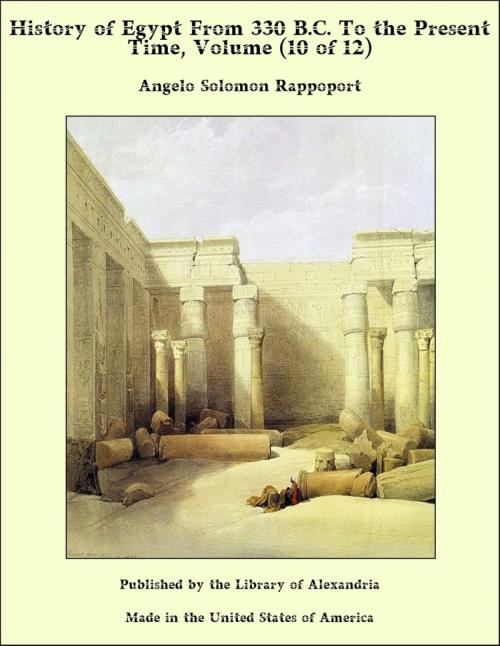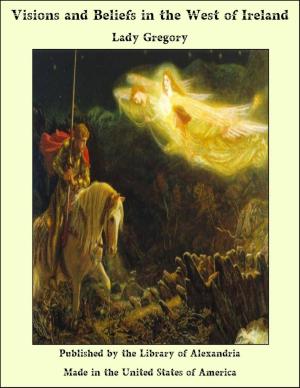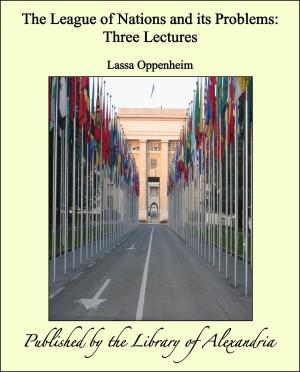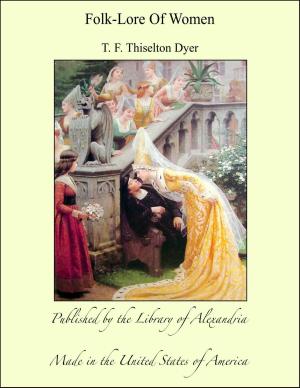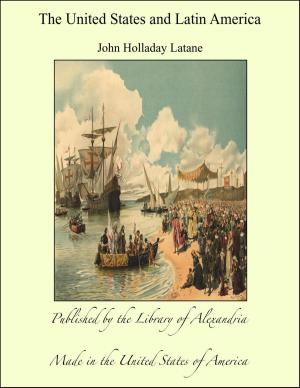History of Egypt From 330 B.C. To the Present Time, Volume (10 of 12)
Nonfiction, Religion & Spirituality, New Age, History, Fiction & Literature| Author: | Angelo Solomon Rappoport | ISBN: | 9781613105207 |
| Publisher: | Library of Alexandria | Publication: | March 8, 2015 |
| Imprint: | Language: | English |
| Author: | Angelo Solomon Rappoport |
| ISBN: | 9781613105207 |
| Publisher: | Library of Alexandria |
| Publication: | March 8, 2015 |
| Imprint: | |
| Language: | English |
When Alexander the Great bridged the gulf dividing Occident and Orient, the Greeks had attained to a state of maturity in the development of their national art and literature. Greek culture and civilisation, passing beyond the boundaries of their national domain, crossed this bridge and spread over the Asiatic world. To perpetuate his name, the great Macedonian king founded a city, and selected for this purpose, with extraordinary prescience, a spot on the banks of the Nile, which, on account of its geographical position, was destined to become a centre, not only of international commerce and an entrepôt between Asia and Europe, but also a centre of intellectual culture. The policy of Alexander to remove the barriers between the Greeks and the Asiatics, and to pave the way for the union of the races of his vast empire, was continued by the Lagidæ dynasty in Egypt. With her independence and native dynasties, Egypt had also lost her political strength and unity; she retained, however, her ancient institutions, her customs, and religious system. The sway of Persian dominion had passed over her without overthrowing this huge rock of sacerdotal power which, deeply rooted with many ramifications, seemed to mock the wave of time. Out of the ruins of political independence still towered the monuments of civilisation of a mighty past which gave to this country moral independence, and prevented the obliteration of nationality. It would have mattered very little in the vast empire of Alexander if one province had a special physiognomy. It was different, however, with the Lagidæ: their power was concentrated in Egypt, and they were therefore compelled to obliterate the separation existing between the conquering and the conquered races, and fuse them, if possible, into one. A great obstacle which confronted the Macedonian rulers in Egypt was the religion of the country. The interest and the policy of the Lagidæ demanded the removal of this obstacle, not by force but by diplomacy. Greek gods were therefore identified with Egyptian; Phtah became Hephæstos; Thot, Hermes; Ra, Helios; Amon, Zeus; and, in consequence of a dream which commanded him to offer adoration to a foreign god, Ptolemy Soter created a new Greek god who was of Egyptian origin. Osiris at that period was the great god of Egypt; Memphis was the religious centre of the cult of Apis, the representative of Osiris, and who, when living, was called Apis-Osiris, and when dead Osiris-Apis. Cambyses had killed the god or his representative: it was a bad move. Alexander made sacrifices to him: Ptolemy Soter did more. He endeavoured to persuade the Egyptians that Osirapi or Osiris-Apis was also sacred to the Greeks, and to identify him with some Greek divinity. There was a Greek deity known as Serapis, identified with Pluton, the god of Hades. Serapis, by a clever manouvre, a coup de religion, was identified with Osiris-Apis. The lingual similarity and the fact that Osirapi was the god of the Egyptian Hades made the identification acceptable.
When Alexander the Great bridged the gulf dividing Occident and Orient, the Greeks had attained to a state of maturity in the development of their national art and literature. Greek culture and civilisation, passing beyond the boundaries of their national domain, crossed this bridge and spread over the Asiatic world. To perpetuate his name, the great Macedonian king founded a city, and selected for this purpose, with extraordinary prescience, a spot on the banks of the Nile, which, on account of its geographical position, was destined to become a centre, not only of international commerce and an entrepôt between Asia and Europe, but also a centre of intellectual culture. The policy of Alexander to remove the barriers between the Greeks and the Asiatics, and to pave the way for the union of the races of his vast empire, was continued by the Lagidæ dynasty in Egypt. With her independence and native dynasties, Egypt had also lost her political strength and unity; she retained, however, her ancient institutions, her customs, and religious system. The sway of Persian dominion had passed over her without overthrowing this huge rock of sacerdotal power which, deeply rooted with many ramifications, seemed to mock the wave of time. Out of the ruins of political independence still towered the monuments of civilisation of a mighty past which gave to this country moral independence, and prevented the obliteration of nationality. It would have mattered very little in the vast empire of Alexander if one province had a special physiognomy. It was different, however, with the Lagidæ: their power was concentrated in Egypt, and they were therefore compelled to obliterate the separation existing between the conquering and the conquered races, and fuse them, if possible, into one. A great obstacle which confronted the Macedonian rulers in Egypt was the religion of the country. The interest and the policy of the Lagidæ demanded the removal of this obstacle, not by force but by diplomacy. Greek gods were therefore identified with Egyptian; Phtah became Hephæstos; Thot, Hermes; Ra, Helios; Amon, Zeus; and, in consequence of a dream which commanded him to offer adoration to a foreign god, Ptolemy Soter created a new Greek god who was of Egyptian origin. Osiris at that period was the great god of Egypt; Memphis was the religious centre of the cult of Apis, the representative of Osiris, and who, when living, was called Apis-Osiris, and when dead Osiris-Apis. Cambyses had killed the god or his representative: it was a bad move. Alexander made sacrifices to him: Ptolemy Soter did more. He endeavoured to persuade the Egyptians that Osirapi or Osiris-Apis was also sacred to the Greeks, and to identify him with some Greek divinity. There was a Greek deity known as Serapis, identified with Pluton, the god of Hades. Serapis, by a clever manouvre, a coup de religion, was identified with Osiris-Apis. The lingual similarity and the fact that Osirapi was the god of the Egyptian Hades made the identification acceptable.
